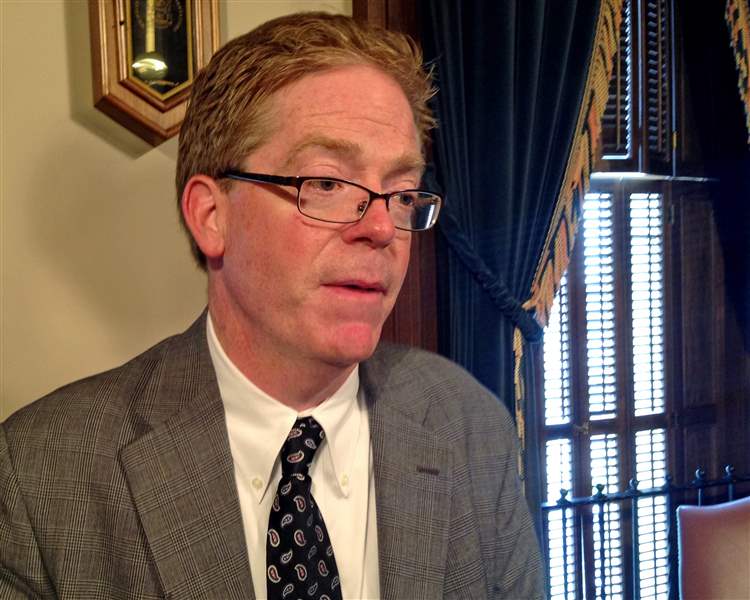
Michigan lawmakers take a step toward committing $195 million to Detroit bankruptcy compromise
5/21/2014
Rep. John Walsh, R-Livonia, who chaired a special committee tasked with considering Detroit bankruptcy-related legislation.
ASSOCIATED PRESS

Rep. John Walsh, R-Livonia, who chaired a special committee tasked with considering Detroit bankruptcy-related legislation.
LANSING, Mich. — Michigan lawmakers took a first step today toward committing $195 million in state money to protect Detroit retiree pensions and city-owned art as part of a broader deal designed to help end the largest public bankruptcy in U.S. history.
In bipartisan fashion, a legislative committee sent bankruptcy bills to the Republican-led House, which could vote as early as Thursday. One bill would transfer $194.8 million from Michigan’s savings account to an authority that would disburse the money to Detroit’s two retirement systems, if the bankruptcy judge approves a restructuring plan resolving the city’s debts and other conditions are met.
The up-front state payment, the equivalent of $350 million spread over 20 years, is meant to join with $466 million in commitments over 20 years from foundations and the Detroit Institute of Arts to prevent steep cuts in pensions and the sale of art. The state’s rainy day account, called the Budget Stabilization Fund, which now has $580 million, would be repaid with annual $17.5 million withdrawals from Michigan’s tobacco settlement over 20 years.
Bond insurers have pointed to the art as a possible billion-dollar source of cash in the 10-month-old bankruptcy case. But the city is firmly opposed to that and instead is banking on the separate deal brokered by mediators that would protect the art forever and soften pension cuts for thousands of retirees.
Mediators announced today that the United Auto Workers will help raise “material” contributions toward retiree health care costs as part of the “grand bargain” without contributing its own funds. That news was welcomed by House Speaker Jase Bolger, R-Marshall, who has warned he might not hold a vote without unions kicking in some cash. It also came on the heels of the Michigan Building and Construction Trades Council separately agreeing to donate money.
The lobbying will now intensify as Republican Gov. Rick Snyder and supporters say legislators should help Detroit rather than risk a protracted bankruptcy and putting retirees potentially into poverty, costing the state an estimated $250 million in social safety net costs over 20 years. Conservative activists led by Americans for Prosperity say Detroit should get no wasteful “bailout.”
“We brought a lot of people together with very divergent, very divergent viewpoints,” said Rep. John Walsh, R-Livonia, who chaired the House Committee on Detroit’s Recovery and Michigan’s Future. “An issue that could have easily spiraled into a lot of confrontation, I think people kept their cool, kept their eye on the objective — which is a healthy Detroit and a healthy Michigan.”
He added that “time will tell” if there is enough House support to quickly move the legislation to the GOP-led Senate.
The bills would create a commission — modeled after oversight of New York City that began in the 1970s — of mostly state appointees to oversee all aspects of Detroit’s finances after it no longer is under a state emergency manager. The board would review and approve four-year financial plans, city contracts for good and services, and revenue projections.
While emergency manager Kevyn Orr’s plan requires the preservation of a 10-year millage in Wayne, Oakland and Macomb counties to support the art museum, the legislation would prohibit its renewal in 2023 because the city-owned museum would be spun off independently under the pension and art rescue.
Before voting, the panel made changes to the bills to address concerns raised by Detroit Mayor Mike Duggan, union representatives and others. They include:
- making the proposed oversight commission a nine-member body to make room for a city council representative.
- forcing the oversight board to go dormant if the city makes sound financial decisions and passes balanced budgets for three straight years. If the city is in a period of “non-control” for 10 years, the committee would dissolve.
- stripping a provision that would have required new hires to have 401(k)-only retirement plans once collective bargaining contracts expire. Instead, the city and unions could negotiate for pension or hybrid plans as long as the city does not contribute more than 7 percent of an employee’s salary to retirement.